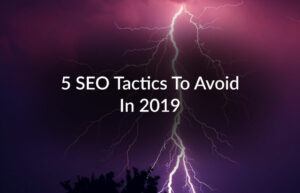When it comes to implementing an SEO campaign, not all strategies are created equal. Some tactics, known as “black hat SEO,” prioritise quick gains over long-term success, often at the expense of user experience and search engine guidelines.
As a leading digital marketing agency with over a decade of experience in the industry, we at Clickslice strongly advise against employing black hat SEO techniques. And it’s not just because these tactics are often nothing more than scams dressed up as intelligent marketing; there’s actually quite a lot at stake when you use dodgy tactics to boost your site’s SEO, especially if your business is your livelihood.
So, why avoid it? In the following blog post, we’re going to take a closer look at what black hat SEO entails, its risks, and why focusing on ethical SEO practices is the key to sustainable online success. Let’s get started.
What is Black Hat SEO?
Black hat SEO refers to a set of unethical techniques used to manipulate search engine rankings; in short, these methods violate search engine guidelines and attempt to deceive algorithms into ranking a website higher than it deserves. While black hat tactics may yield short-term results, they ultimately put your website at risk of severe penalties and even complete removal from search engine results pages (SERPs).
Risks and Dangers of Black Hat SEO
As we alluded to above, engaging in black hat SEO practices can have serious consequences for your website, business, and even your bottom line. Search engines like Google are constantly improving their algorithms to detect and penalise websites that employ deceptive tactics, and if you’re caught implementing these measures, your website may face:
- Manual penalties: Search engines can manually review and penalise your site, leading to a significant drop in rankings or complete removal from SERPs.
- Algorithmic penalties: Updates to search engine algorithms can automatically detect and penalise black hat techniques, resulting in a sudden and drastic decline in organic traffic.
- Reputation damage: Being associated with black hat SEO can tarnish your brand’s reputation, making it difficult to regain trust from both search engines and potential customers.
Common Black Hat Techniques to Avoid
To steer clear of the dangers associated with black hat SEO, it’s essential to be aware of common unethical practices. Here are some red flags to look out for:
- Keyword stuffing: Unnecessarily repeating keywords in content, meta tags, and alt text to manipulate rankings.
- Cloaking: Presenting different content to search engine crawlers than what users see, often to deceive search engines.
- Hidden text and links: Using text or links that are invisible to users but visible to search engines, often by matching the text colour to the background colour.
- Link schemes: Buying or exchanging links solely for the purpose of manipulating PageRank or rankings.
- Doorway pages: Creating multiple pages optimised for specific keywords with the sole purpose of redirecting users to a different page.
Case Studies

Throughout our years in the industry, we’ve witnessed numerous cases where websites have suffered the consequences of black hat SEO. In one instance, a client came to us after their website was completely removed from Google’s search results due to engaging in link schemes and keyword stuffing.
As you can imagine, it took months of work and a complete overhaul of their SEO strategy to recover their rankings and regain trust with search engines, and although it was possible, it ended up costing them around 10 times the value of their initial “cheap” investment. And it’s also fair to say that we only managed to recover their site because we’re pretty much the best London SEO agency out there – even if we do say so ourselves!
Bragging aside, the bottom line is simple: if an SEO package seems too good to be true, it’s probably because it is.
Ethical SEO Practices
At Clickslice, we firmly believe in the power of ethical SEO practices underpinned by a long-term vision. By focusing on creating high-quality, valuable content, building genuine relationships, and following search engine guidelines, we help our clients achieve sustainable growth and long-term success. Some key elements of our approach include:
- Keyword research and optimization
- Content creation and optimization
- Technical SEO (site speed, mobile-friendliness, structured data)
- Link building through outreach and content promotion
Educating Stakeholders
One of the most critical aspects of avoiding black hat SEO is educating stakeholders about the importance of SEO education. As an SEO agency that prides itself on our long-term partnerships with our customers, we at Clickslice always make it a priority to inform our clients about the risks of unethical practices and the benefits of a white hat approach. Rather than promising the pot of gold at the end of the rainbow, we instead foster a culture of transparency and collaboration, where we empower our clients to make informed decisions about their SEO strategies with the help of our expertise.
Final Thoughts
It’s simple – while taking shortcuts and engaging in black hat SEO techniques may seem tempting, the risks far outweigh any potential short-term gains. By prioritising ethical, white hat SEO practices, you can build a strong foundation for your website’s long-term success. And as a trusted partner in your digital marketing journey, Clickslice is committed to helping you navigate the complex landscape of SEO while adhering to industry best practices. So if you’re ready to take your online presence to the next level, get in touch with us today to learn more about how we can help you achieve your goals – the right way.










